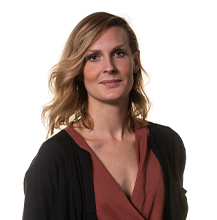How influencer marketing pushes the boundaries of privacy

Text: Martine Mengers, journalist på cbs (mm.slk.@cbs) I Photo: Shutterstock
Almost every other Dane between 18 and 29 years of age followed influencers on social media in 2020. An analysis made by the Danish Chamber of Commerce shows this, and the number is close to a fourth when looking at all age groups. We love to be part of the lives of influencers who excel in giving us a feeling of getting close to them and be part of a community.
This is exactly the reason that influencer marketing has been the most increasing type of marketing for over 10 years from a financial point of view. In only a decade, this discipline has developed from a cultural phenomenon to a booming industry. The biggest influencers in Denmark can charge up to DKK 100,000 for an Instagram post[1], and more and more companies consider social media their primary branding platform.
These are the words of Anna-Bertha Heeris Christensen, Assistant Professor at the Department of Marketing, CBS, who recently defended her PhD thesis on challenges and conflicts in influencer marketing.
Over a five-year period, she has observed Danish influencers and the actors around them, e.g. some of the media companies who work with influencer marketing to look into the details of this type of marketing and which conflicts arise when working with people in a commercial context.
”In order for influencers to do well, they must be authentic and credible and have a personal and consistent self-representation. So, for companies it is about finding influencers who match them well. This way, they can embed their messages in the influencers’ own messages”, explains Anna-Bertha Heeris Christensen and ascertains that influencing – contrary to what many people believe – is not about being perfect but about being authentic and relatable.
No more hidden ads and spotless selfies
This type of marketing has otherwise been called crazy and an ephemeral phenomenon. Soon, the critical consumer will find out that it is not personal recommendations but pure advertising, the argument was.
But that is not how it worked out. On the contrary, influencer marketing has spread across industries. Where it used to be primarily fashion and cosmetics companies who used private individuals as a showcase, today all kinds of companies enter into agreements with influencers; going from the dairy company Arla Foods to financial companies such as Nordea.
In 2021, more stringent rules made it easier for consumers to decode when something is a commercial. In spite of this, we are still inclined to believe it when the influencer promotes L’Oréal makeup or food box services.
So why do we fail to use our critical thinking, you might ask?
”Because this type of marketing resonates well with very fundamental human characteristics,” says Anna-Bertha Heeris Christensen and adds:
“Cognitively, people are lazy. So, when an influencer with whom we have developed a relationship of trust recommends a product or a service, in principle, we trust it. This way, we do not have to look for the information ourselves,” fortæller hun.
SEO-friendly breakfast and kids in stories
The massive growth of the industry has reignited the ethics debate.
Therapists and researchers have problematised the challenge of being as exposed as influencers and pointed to the mental load and potential anxiety of being on platforms such as Instagram.
Similarly, modern fiction, e.g. bestselling author Delphine de Vigan's latest novel, ‘Les enfants sont rois (the children are kings)’ has discussed the consequences of our apparently infinite need to document and expose our own – and not least our children's – lives on social media.
And it is exactly this debate that the research of Anna-Bertha Heeris Christensen brings new answers and perspectives into.
”My study shows that it has consequences when everything in your personal life becomes a commercial opportunity and you are constantly “motivated” to give more of yourself to your followers.”
By using the thoughts of sociologist Michel Foucault, she describes how the influencer starts to internalise the commercial logic.
”The influencer is affected by everything from their agents, the desires of companies and algorithms of social media and starts to absorb these considerations more or less consciously, for instance when thinking about the SEO-friendliness of her breakfast or considering whether a story showing her feelings will have more likes.”
The internalisation makes it difficult to see how and when the boundaries are pushed, explains Anna-Bertha Heeris Christensen and exemplifies:
”An influencer may not wish to use her child in an advertisement, however, companies may demand it or other mom influencers may do well, and then the influencer starts to show her children on social media. Children is a very important part of our personal lives but for influencers, children are potentially a great branding opportunity.
Privacy is important
Another theory Anna-Bertha Heeris Christensen uses is the theory of sociologist Arlie Hochschild on emotional labour. With 80s flight attendants as a case, Hochschild described the regulation of emotions as part of a job. It is not only about expressing certain feelings, it is in fact about feeling them.
And according to Anna-Bertha Heeris Christensen, that is what is at stake for influencers who, as opposed to the conventional models who act as poster people for products, also invest their personality in the campaigns they make. It is a process where privacy and personality are structured for a commercial purpose and this may have consequences.
Because even though Anna-Bertha Heeris Christensen in her capacity as a researcher will not be the judge of whether influencing is good or bad, she does see some red flags when everything in your personal life from arguing with your partner to being sick has a commercial potential.
”We know that privacy is important to a human being, and that it is important to feel that you are not always “on” – that it is important to feel that you do not always have to perform. Basically, influencer marketing pushes these feelings and boundaries. Because when are personal matters personal and where does the staging stop? Where and by who are these boundaries set?”
We need ethical guidelines
According to Anna-Bertha Heeris Christensen, it is about time to make some ethical guidelines for company-influencer collaborations, so we can take better care of this type of workers.
“In my opinion, it is a huge problem that the current society have a labour market which is entirely unregulated in relation to this type of work,” says Anna-Bertha Heeris Christensen.
Still, she finds that things are changing:
”The conversation about the ethical aspects has started. Where it ends, I do not know. But I think we should take this development very seriously because people need privacy,” she concludes.




